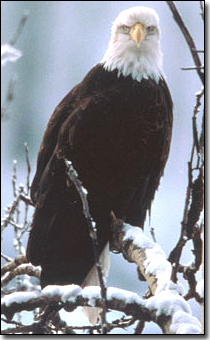Good news for the Bald Eagle
Posted By RichC on February 14, 2006
 The U.S. now has an estimated 7066 pairs of nesting Bald Eagles in the lower 48 and the U.S. Fish and Wildlife Service today reopened the public comment on its 1999 proposal to remove the bird from the endangered species list. The director Dale Hall states that “The recovery of the bald eagle, our national symbol, is also a great national success story and the actions we take today reemphasize the management efforts that have proven so successful in recovering eagle populations. Should the eagle be delisted, we expect that the public will notice little change in how eagles are managed and protected.”
The U.S. now has an estimated 7066 pairs of nesting Bald Eagles in the lower 48 and the U.S. Fish and Wildlife Service today reopened the public comment on its 1999 proposal to remove the bird from the endangered species list. The director Dale Hall states that “The recovery of the bald eagle, our national symbol, is also a great national success story and the actions we take today reemphasize the management efforts that have proven so successful in recovering eagle populations. Should the eagle be delisted, we expect that the public will notice little change in how eagles are managed and protected.”
When wildlife is ‘delisted’ from the Endangered Species Act, animals and birds like bald eagles will continue to be protected by the Bald and Golden Eagle Protection Act (BGEPA) and the Migratory Bird Treaty Act (MBTA). Both acts protect bald eagles by prohibiting killing, selling or otherwise harming eagles, their nests or eggs.
According to Sci-Tech Today, the U.S. Fish and Wildlife Service is also proposing a regulation to clarify the term “disturb” under BGEPA that is consistent with existing Federal and State interpretation. “Under the clarification, “disturb” would be defined as actions that disrupt the breeding, feeding or sheltering practices of an eagle, causing injury, death or nest abandonment. This is the standard the Service has used informally over the years and how states have interpreted the statute. The proposed regulation defining “disturb” would codify it.”
The low point for the Bald Eagle was in 1963, when only 417 nesting pairs were known to exist in the United States. At one time, the bald eagle flourished in every state except Hawaii. Once measures were taken to reduce pollution and clean up our use chemicals in farming, the recovery of the bald eagles re-established in most areas at an impressive rate. Most environmentalist contribute the ban on the pesticide DDT in 1972 as the turning point in saving this endangered species.
Sci-Tech Today reports that if the bald eagle is delisted, the Service will work with state wildlife agencies to monitor the status of the species for a minimum of five years, as required by the Endangered Species Act. A draft monitoring plan is expected to be released for public comment should the species be delisted. If at any time it becomes evident that the bald eagle again needs the Act’s protection, the Service will propose to relist the species.
Comments